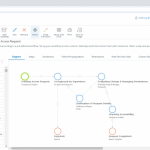The phrase “business optimization” may mean different things to different people. For many, any process or tactic that is used to help streamline a company, such as the implementation of workflow automation software such as that offered by Comindware.
For others, however, they have something more specific in mind. Business optimization, in this sense, is a step-by-step process that helps you reach strategic goals while cutting waste in the process.
Important Steps in Quality Business Optimization
There are a few steps that will help you develop a more streamlined business that is efficient and well-tuned towards meeting specific goals. Waste is reduced and there is a definable process by which this takes place.
Firstly, you will want to create a solid platform of analytics tools. Data is incredibly important and will guide processes and decision-making in various processes. You need to make sure that all parties are working with the same, accurate, and up-to-date information.
Without quality data that is current and accurate, it is hard to make sure that any plans you create are solid and actionable. Not only do you need quality, accurate data, you need the tools that allow you to make sense of all this data.
Next, you will want to determine which data matters. Which data informs performance? There are performance indicators that might be specific to your industry. You will need to be able to sift through a mass amount of data and determine which numbers matter and which don’t.
You will want to develop both long- and short-term plans and goals. In order to have successful business optimization, you need testable and actionable goals. Your short-term goals may help you reach your long-term goals or they may be separate from overall strategic goals.
A key to business optimization is the ability to be flexible in pursuing specific goals. Some goals may not really help you reach your long-term goals and thus may be wasteful uses of your time and resources. You will need to be able to shift resources and time to be able to focus on goals that will get you closer to your long-term goal.
Another key element of optimization is using the data you have to make changes and improvements to your long-term and short-term goals and plans. While we may have quality data that allows us to make solid plans, as we put the process into action, we may be faced with new information that requires us to change our process or tactics.
One of the key benefits of business optimization is that it makes you more efficient, yet flexible. In an ever-changing world of business, that is always integrating new data and technologies, having a static, unchangeable set of goals is not realistic.
A business needs to be able to adjust and optimize workflows in order to reach operational excellence, stay relevant and able to compete with other businesses. The one thing that is hard to plan for, but needs to be planned for, is flexibility. Your business has to have the ability to make adjustments and changes on the fly when data presents itself that warrants these actions.
In Closing
It is helpful to understand what all is entailed in real business optimization. Knowing the different steps and elements you should focus on will help guide your optimization to help you get the most out of your efforts.
This process is highly data-driven and with the use of new technologies, you can use current, accurate data to help guide your planning and decision-making processes. It will help your business to develop and reach both short- and long-term goals and allow your business to remain flexible and versatile, which is so important to the business of the future.
With the integration of technologies and tweaking of your data and processes, you can be sure that the data you are using is accurate and current, which will better help you in your goal planning and decision-making processes. You must determine what data and metrics are the most important parts of meeting your stated goals and how you can tweak and optimize other processes to help you reach these goals. The idea is to improve your ability to take data and make actionable plans that will move your business closer to your goals.
